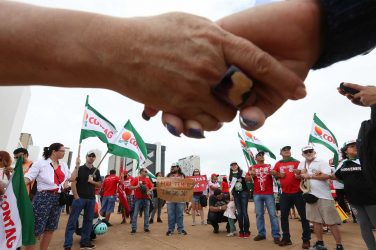 Two months ago the press divulged the fact that Brazil’s Bolsa Família Program had stopped requiring that the children of the Program families attend school. These denunciations had great repercussions.
Two months ago the press divulged the fact that Brazil’s Bolsa Família Program had stopped requiring that the children of the Program families attend school. These denunciations had great repercussions.
Now, with the revelation of serious flaws in the Program’s management, the repercussions are much greater. Despite the seriousness of the managerial problem, the previously denounced conceptual problem is far graver.
While Minister of Education, I participated in the studies leading to the unification of the Bolsa-Escola Program and the assistance programs put in place by the Fernando Henrique administration, thus forming the Bolsa Família Program.
The idea was an attractive one because, while maintaining the school-attendance requirement, it would permit the pooling of resources from diverse programs.
The plan was to bring all the programs together in a broader Bolsa-Escola with a different name that would be the hallmark of the new administration, as publicist Duda Mendonça said in a meeting at the Planalto Palace, the President’s office.
We were thus transforming an educational program, the Bolsa-Escola, and the assistance programs like Vale Gás (subsidies for buying cooking gas) and Bolsa-Alimentação (subsidies for buying food) into a single educational program, guaranteeing that children would attend school and that illiterate adults would learn to read.
But we were mistaken. We mixed different things together that do not add up.
We stopped considering that, in a country with as much poverty as Brazil’s, there are families who require government assistance—with no conditions to be met—to eat, and there are families that need educational aid—with conditions—to leave poverty.
Programs like Vale Gás and Bolsa Alimentação are government assistance programs, while the Bolsa-Escola Program is an educational one. They should not have been mixed together.
When we mixed them, we created the basis for setting the assistance programs in stone and/or for annihilating the educational program.
Part of poor Brazilian families—those with elderly household members, unemployed single people, and many small children—need help buying gas and food.
Another part—those families with school-age children—need help to keep their children attending school.
The first part could need help forever; but, thanks to their children’s schooling, in time the others will be able to leave poverty behind. That difference was wiped out when we unified different programs with different goals.
Another error was concentrating the programs into a single ministry.
Patrus Ananias, the Minister of Social Development and the Fight against Hunger, was much criticized when he said that we could not let a family go hungry simply because the children were not attending school. Seen from the perspective of his ministry, he is right.
Brazil needs assistance programs, whether they be unified or not, and also needs an educational program functioning under any name whatsoever so long as it maintains the concept of the bolsa-escola as it is utilized today in diverse parts of the world.
By simply supporting them in their poverty, the assistance program meets the poor families’ needs without imposing conditions. The educational program conditions the help upon school attendance, with the conviction that educating children will break the vicious circle of poverty.
The first program must be managed by the Ministry of Social Assistance; the second, by the Ministry of Education, which already administers scholarship programs for university students.
The attempt at program unification was correct but it will be incorrect to maintain it after we have perceived the error.
The President, who indebted himself so much with the unification, must promote the separation and return the bolsa-escola to the Ministry of Education.
If this is not done, we run the risk of leaving a sad legacy for the next administration: the destruction of a Brazilian program, which was born in the Workers Party, established nationally by the Fernando Henrique Cardoso administration, awarded prizes and copied internationally.
Thanks to the denunciations made to the management, we can correct this conceptual error.
In addition, if the school should remain in the present horrid conditions, it is not enough to pay a bolsa-escola.
The bolsa-escola only makes sense with good-quality schools. And the school will not be of good quality as long as it depends upon the meager resources of each poor municipality.
To get the desired result, the bolsa-escola must be part of a federalization program for K-12 education in Brazil.
Cristovam Buarque has a Ph.D. in economics. He is a PT senator for the Federal District and was Governor of the Federal District (1995-98) and Minister of Education (2003-04). You can visit his homepage – www.cristovam.com.br – and write to him at cristovam@senador.gov.br.
Translated from the Portuguese by Linda Jerome – LinJerome@cs.com.









